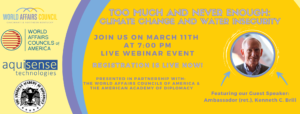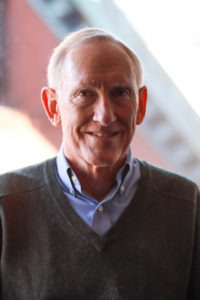
- This event has passed.
Too Much and Never Enough: Climate Change and Water Insecurity – Our discussion with Ambassador Kenneth Brill
March 11, 2021 @ 7:00 pm
FREE
National and international security, stability and prosperity will face novel challenges in the coming decades. Rivalry between the “great powers” (U.S., China, and Russia), as well as between regional states, will remain a feature of 21st Century international relations. But novel transnational issues, such as climate change, cyber space, and pandemic diseases, will establish the context in which rivalries between states play out; at the same time, these transnational challenges will require global cooperation to prevent them from becoming potentially existential threats to human well being.
Climate change is the most all encompassing of transnational threats. The natural world, which is the basis for all human societies, had adapted to one set of climatic conditions, but is now adapting to new and still changing climatic conditions. That adaptation, the historical data show, will change the nature and location of the global water supply, whether frozen or liquid, as well as sea levels. This will lead to various kinds of water insecurity, which, in turn, will increase state fragility and failure, increasing the potential for instability and potentially domestic and cross-border conflict. To give an example of the scale of the issue, a 2015 National Academy of Sciences study suggested that an increase in global temperatures of 7.2 degrees Fahrenheit — a business-as-usual scenario — could lock in enough eventual sea-level rise to submerge land currently home to 470 to 760 million people globally by the end of the century. Asia would be the hardest hit region, but more than 20 million people would be affected in U.S. coastal areas.
Ambassador (ret.) Ken Brill will discuss how climate change is producing water insecurity, the various forms that insecurity can take, what regions globally are most prone to experiencing water insecurity, what the long term implications of growing water insecurity are, how these issues are being addressed currently and, and what more can be done manage water-related challenges to stability and prosperity.
About Ambassador Kenneth Brill

Ambassador (ret.) Kenneth C. Brill was a career Foreign Service Officer whose overseas posts were in Africa, the Middle East, South Asia, and Europe. His domestic assignments included African and Middle Eastern issues, acting Assistant Secretary for the Bureau of Oceans and International Environmental and Scientific Affairs (OES), and staff jobs for senior State Department policy officials.
Brill served as Ambassador to Cyprus for President Clinton and Ambassador to the IAEA and the UN Office in Vienna for President George W. Bush. In his final Foreign Service assignment, he was asked by the first Director of National Intelligence, John Negroponte, to establish and lead the U.S. National Counterproliferation Center, an organization providing strategic leadership to the U.S. Intelligence Community in countering the proliferation of weapons of mass destruction (WMD) and preventing WMD terrorism. After retiring from the Foreign Service he has worked with non-partisan NGOs in various capacities on issues ranging from nuclear security and strengthening America’s diplomacy to fragile states and climate change.
Brill is a graduate of Ohio University and received his MBA from the University of California at Berkeley. He and his wife, Mary, have two children and one granddaughter. His op-eds have appeared in the New York Times, the Washington Post, USA Today, Politico, and The Hill.


